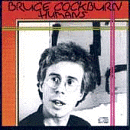 [1] Grim Travellers (4:51)
[1] Grim Travellers (4:51)
"It's been a heavy year personally. I was on tour in Italy and Japan and
Canada, and travelling like that is always very intense. On top of that, my
wife and I separated. Two of the songs, How I Spent My Fall Vacation and
Tokyo, are basically impressions of my travels. Three songs - You Get Bigger
as You Go, What About the Bond and Fascist Architecture - deal specifically
with the separation. But I think enough people go through stuff like that, so
the songs have a fairly universal application. The whole album deals with a
lot of pain and death - a lot of the ugliness that I've encountered around
me. But I hope it comes across that even in the face of it, there's still
ground for hope. Songs like Rumours of Glory and The Rose Above the Sky are
about moving from downness into something that opens up, although what that
something is is not really spelled out."
[....he continues, later in the interview....]
"A lot of the songs on Humans came out of my realization that I needed other
people," he says, smiling. "I've always been a loner and kept a distance
between myself and even those I've regarded as friends. But all of a sudden
when I was getting kicked around and battered, all these people were right
there - they came through in a way I never would have expected."
-- from "Bruce Cockburn's Quiet Optimism", High Fidelity, 1981, by Stephen Holden.
"More travel- Italy, Japan again, more in U.S.A....major change of
circumstance in my life, shaking up a lot of assumptions, as well as the
beginnings of an appreciation of what life is like for most people in the
world. Moved to Toronto."
-- from the World Of Wonders Tour Program, circa 1986. Submitted by Rob Caldwell.
James Jensen: In the 80's with "Humans" you really seemed to be hungry for a change of sound.
BC: I had been listening to Reggae and Punk music and I'd started to
travel outside North America in the later 70's and that effected the
content of the lyrics and a lot of other stuff that was happening in
my life effected that as well. Like I said before the music in my
songs is in support of the lyrics so the nature of the lyrics has
alot to do with what the music ends up sounding like.
Some kinds of thoughts don't suit the acoustic style that I'd been
using and I wanted to learn to play electric guitar. I wanted to
have bands that sort of kicked-ass a little more than I had been
doing and it's an inevitable escalation once you have a band because
you want drums and once you have drums you want electric bass and
once you've got that going you better be playing electric guitar or
you won't hear anything that your doing. We've licked that problem a
lot in the last few years but in the late 70's and early 80's there
were no guitar pickups that were any good for acoustic guitar, at
least none that sounded anything like an acoustic guitar, so that was
part of it too. I really wanted to play Reggae music and Rock 'n
Roll and I wanted to make people get up and dance.
-- from an Interview by James Jensen at Sunset Sound, Los Angeles, circa Spring 1993.
-- from "Faith in Practice: Holding on to the Mystery of Love" by Bruce Cockburn (as told to Cole Morton), Third Way, September 1994. Submitted by Nigel Parry.
-- from Bruce Cockburn Interview, Guitarist Magazine, November, 1999, by Steve Lawson.